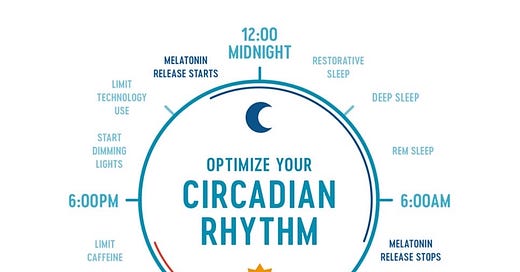Optimize Your Circadian Rhythm
Optimize your circadian rhythm with a yoga and meditation practice.
Something I have been really interested in lately is how to feel my best on a consistent daily basis. The rhythm our bodies sync to is super important. Our bodies have a natural internal clock that regulates our sleep and wake cycles, known as the circadian rhythm. This cycle is influenced by environmental factors, such as light and temperature, and plays a crucial role in our overall health and well-being.
When our circadian rhythm is disrupted, it can lead to sleep problems, fatigue, and even mood disorders. In today's fast-paced society, it's easy to fall out of sync with the natural pace of the earth, I know I have felt this way. I want to share several tips you can follow to help get back on track.
Get plenty of natural light exposure: The most important factor in regulating your circadian rhythm is exposure to natural light. Try to get outside in the morning and expose yourself to natural light as soon as possible after waking up. This helps to signal to your body that it's time to wake up and start the day.
Avoid artificial light at night: Artificial light, especially blue light emitted by electronic devices, can disrupt your natural sleep-wake cycle. Try to avoid using electronic devices for at least an hour before bedtime and consider using blue light filters on your devices if you must use them at night.
Establish a regular sleep routine: Going to bed and waking up at the same time every day helps to regulate your circadian rhythm. Establish a sleep routine and stick to it as closely as possible, even on weekends.
Maintain a comfortable sleeping environment: Your sleeping environment plays a significant role in the quality of your sleep. Keep your bedroom cool, quiet, and dark to promote restful sleep.
Exercise regularly: Regular exercise can help regulate your circadian rhythm and improve sleep quality. However, avoid exercising too close to bedtime, as this can disrupt your ability to fall asleep.
Limit caffeine and alcohol intake: Caffeine and alcohol can disrupt your sleep cycle and should be limited, especially in the hours leading up to bedtime.
Practice relaxation techniques: Stress and anxiety can disrupt your sleep cycle and contribute to circadian rhythm disturbances. Practice relaxation techniques, such as meditation or deep breathing, to help reduce stress levels and promote better sleep.
Your yoga and meditation practice can be highly beneficial for regulating your circadian rhythm and syncing with the earth's natural pace. Here are some ways in which they can help:
Reducing stress levels: Both yoga and meditation are effective tools for reducing stress levels. Stress and anxiety can disrupt your sleep-wake cycle, leading to circadian rhythm disturbances. By reducing stress levels, yoga and meditation can help promote better sleep.
Improving sleep quality: Practicing yoga and meditation regularly can help improve the quality of your sleep. They promote relaxation and help calm the mind, making it easier to fall asleep and stay asleep.
Regulating the circadian rhythm: Certain yoga poses and meditation techniques are specifically designed to regulate the circadian rhythm. For example, the practice of yoga nidra, also known as "yogic sleep," is designed to promote deep relaxation and help regulate the sleep-wake cycle.
Enhancing mindfulness: Mindfulness is the practice of being present in the moment and fully engaged in the present experience. Practicing mindfulness through yoga and meditation can help you become more aware of your body's natural rhythms and better able to sync with the earth's natural pace.
So why not incorporate yoga and meditation into your daily routine? They can help regulate your circadian rhythm and improve the quality of your sleep. They promote relaxation, reduce stress levels, and enhance mindfulness, all of which are key factors in maintaining a healthy sleep-wake cycle. I hope you will join me on this mission to better our health!





